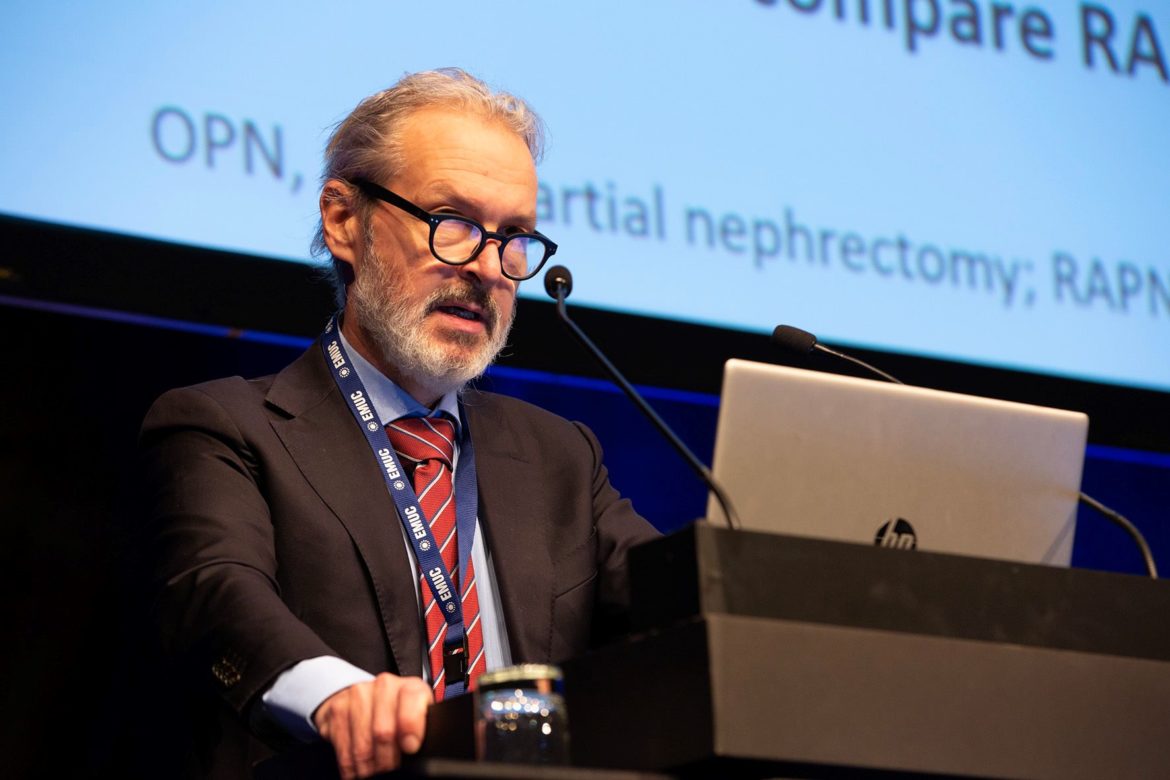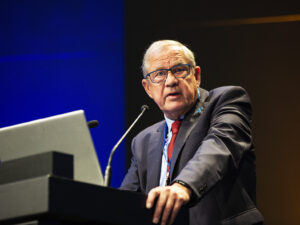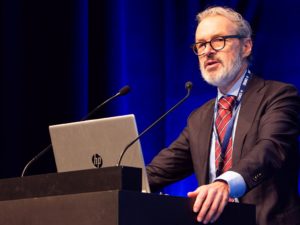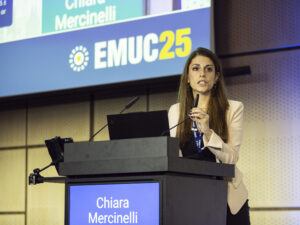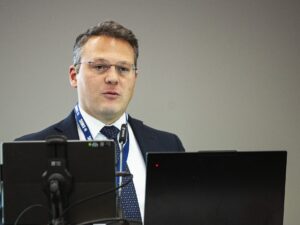A selection of new trial results were shared and discussed in Plenary Session 5 on day three of EMUC22. Urologist Prof. Arnulf Stenzl (DE) and oncologists Prof. Karim Fizazi (FR) and Prof. Gert de Meerleer (BE) chaired the session, with presenters and discussants delving into the latest outcomes for PEACE-1, OpeRa, Adjuvant therapies in high-risk RCC, Effect of robot-assisted radical cystectomy with intracorporeal urinary diversion vs open radical cystectomy on 90-day mortality among patients with bladder cancer and TRISST.
PEACE-1
Oncologist Dr. Alberto Bossi (FR) presented the latest trial findings. “Adding abiraterone to ADT+docetaxel significantly improves rPFS (radiographic progression-free survival) by a median of 2.43 years in men with de novo metastatic prostate cancer. Overall survival is also improved with a 25% reduction in the risk of death, even when 84% of mCRPC (metastatic castration-resistant prostate cancer) men in the control group receive at least one life-prolonging treatment.”
“This benefit translates in a median lifetime gain of more than 1.5 years for men with high-volume metastases (5.1 vs 3.5y). Toxicity was as expected, with no apparent synergistic side effects from this combination. For the future, there needs to be results for radiotherapy and local symptoms.”
Further exploring the topic, Prof. Nicolas Mottet questioned the benefit for everyone. He pointed out that even though quality of life (QoL) levels out equal after 48 weeks when adding DXL, there is initially a significant decrease in QoL for the first 24 weeks with both physical and social functioning. He added that direct efficacy comparison between trials was highly questionable and there was no added value to the triplet option.
Prof. Mottet concluded “This is the first time you will see the new 2023 EAU-EANM-ESUR-ESTRO-ISUP-SIOG-ESUR Guidelines, which recommends to offer docetaxel only in combination with abiraterone or darolutamide in addition to ADT to patients with M1 disease and who are fit for docetaxel and are willing to accept the increased risk of side effects.”
OpeRa
Prof. Marc-Oliver Grimm (DE) reported on the first randomised controlled trial (RCT) there has been for comparing OPN (open partial nephrectomy) and RAPN (robot-assisted partial nephrectomy) in intermediate/high complexity renal tumours. “The OpeRa trial represents a real-world example of conducting an randomised clinical trial. It was underpowered due to slow recruitment over the COVID-19 period which resulted in a premature termination, as well as the implications of a differential withdrawal period prior to treatment of 5% for RAPN and 23% for OPN.”
“The results showed a significantly lower procedure-related complication rate with RAPN compared to OPN over 30-days. Overall there were fewer high-grade events, even in higher complexity tumours and patients reported significantly less pain with RAPN. There was a significantly lower skin-to-skin operative time required with RAPN and a 1-day shorter hospital stay time with RAPN, which is significant in terms of cost.”
As a discussant, Prof. Axel Bex (GB) congratulated the investigators on this trial as they are difficult to undertake and agreed with the benefits of quicker recovery time and less time in hospital. In his rebuttal, he questions the clear lack of equipoise among the surgeons and patients. He added “In protocol v2, the experience of surgeons has been downgraded to >10 RAPN/OPN in 12 months which is low. Significant imbalances in BMI and anticoagulants are difficult to explain by randomisation.”
According to Prof. Bex, the trial was also statistically underpowered to investigate the primary endpoint and leans heavily on secondary endpoints which are all difficult to interpret due to the small numbers.
Adjuvant therapies in high-risk RCC
Dr. Javier Puente (ES) presented an overview on the different trials for adjuvant therapies in high-risk RCC including Keynote-564, CheckMate 914, INmotion010 and PROSPER. He stated that adjuvant pembrolizumab has shown improvement in disease-free survival relative to placebo in patients at intermediate-high, high and M1 no evidence of disease (NED) risk groups.
“The INmotion010 trial and Checkmate 914 (Part A) have failed to demonstrate an improvement in DFS (disease free survival), and in the PROSPER trial, perioperative nivolumab did not reach the primary endpoint of RFS (recurrence free survival).” He added that well informed patient selection will be the key.
Clinical Oncologist Robert Huddart (GB) also shared results from the TRISST trial, with discussant Radiologist Harriet Thoeny (CH). You can view the full presentation of Plenary Session 5 via the EMUC22 Resource Centre

